Engineer, Prince's estate face off in court over unreleased music

Go Deeper.
Create an account or log in to save stories.
Like this?
Thanks for liking this story! We have added it to a list of your favorite stories.
Updated 6:45 p.m. | Posted 8:57 a.m.
A new fight is brewing over Prince, his estate and music you haven't heard before.
Prince's estate is suing a California sound engineer who is offering a multi-song selection of unreleased music from the late pop icon. The two sides faced off in an 80-minute federal court hearing Wednesday afternoon before U.S. District Court Judge Wilhelmina Wright in St. Paul.
Turn Up Your Support
MPR News helps you turn down the noise and build shared understanding. Turn up your support for this public resource and keep trusted journalism accessible to all.
Lora Friedemann, the attorney for Prince's estate, told the judge that George "Ian" Boxill was only working for Prince and didn't have any rights to performances recorded at Paisley Park in 2006.
"Anything he may have done to modify or use them for his own purpose, that all belongs to the estate," Friedemann said. Briefs filed with the case argue that rights to Prince's unreleased music have already been assigned to Universal Music Group.
The estate asked Wright to issue an injunction that would bar Boxill or the Rogue Music Alliance record company from releasing the six-song EP they started promoting Tuesday night — even releasing a title tune, "Deliverance," online. More was to follow on Friday, the anniversary of Prince's death, at 57, due to an accidental fentanyl overdose at his home at Paisley Park.
"The toothpaste is out of the tube, and we're not at all happy about that," Friedemann told the judge. She implored Wright to stop any more releases. "The music is unique. We can't release something else ... It's absolutely taken that opportunity away from us in a way that we will never be able to quantify."
Attorney Tony Zeuli, arguing for Boxill, said that in fact it could be quantified — that the two sides had been talking about the music and what to do with it as long as eight months ago, but disagreed on money. He suggested that the estate was dragging its feet, to Boxill's detriment.
He made several other arguments as well. "Mr. Boxill is not just a sound engineer," Zeuli told the judge. "He's a co-author." Zeuli told the judge Boxill was "responsible for the guitar tone, the bass tone and drum tone," and "composed, recorded and produced the backup vocals."
Zeuli also told the judge that Boxill produces and releases his own music.
Boxill was not in court. His attorney said he was in Trinidad, following the death of his father there.
Zeuli countered the estate's argument that Boxill was bound by a non-disclosure agreement to turn over any results of his work at Paisley Park and surrender any rights.
Zeuli pointed out that Boxill did sign a confidentiality agreement, but that neither Prince nor anyone else from Paisley Park did so. He also contended that the agreement only applied to work Boxill did in 2004 for Prince, not a more collaborative arrangement they'd struck — but apparently did not document — in 2006.
"It's not an agreement with regard to musical works," Zeuli argued. "It looks to be an agreement to protect the privacy of Prince."
That music, for now, remains under wraps. The original title track was gone from iTunes and Apple music by the time the federal hearing ended in St. Paul. It isn't clear if the rest will be released on Friday, as the Rogue Music Alliance had promised.
According to The Current, the music sister station of MPR News:
The music that Boxill plans to release includes "Deliverance," "Man Opera" (a four-movement medley comprising "I Am," "Touch Me," "Sunrise Sunset," and "No One Else"), and an extended version of "I Am."
The title track has earned praise from publications like Variety, which calls the song "a bluesy slow-burner with some blazing guitar work, gospelesque backing singers and a soaring falsetto vocal from Prince."
The likelihood of a judge intervening to block the material's scheduled release is unclear. Beyond the principle, the financial stakes are high: the estate's lawsuit claims the tracks are together worth over $75,000.
Judge Wright questioned both attorneys closely during the hearing about copyright law, the limits of the confidentiality agreement Boxill signed and the nature of intellectual property rights. She even asked if an injunction blocking the release of the music might not actually make the EP valuable because of the controversy and scarcity surrounding the music — part of a potential trove of work that Prince left behind, but never made public during his lifetime.
Wright adjourned the hearing without giving an indication of when she might rule.




